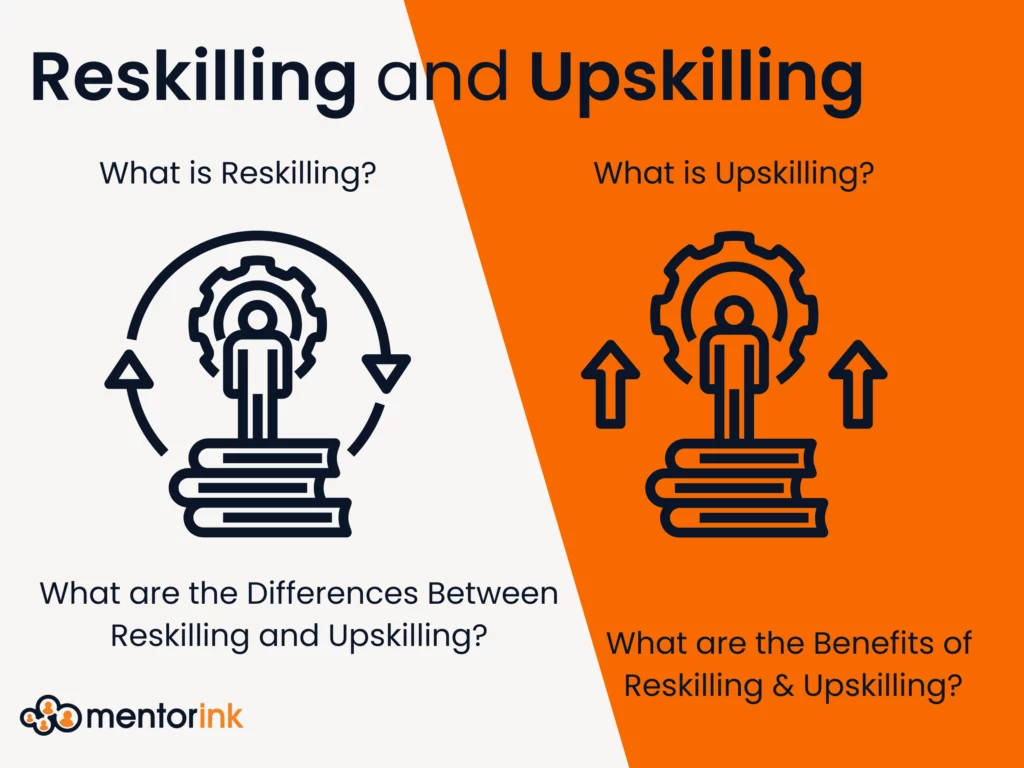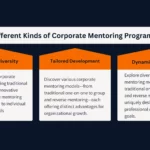
The concepts of reskilling and upskilling have grown in importance in today’s rapidly shifting employment landscape. Because companies evolve and technology evolves, the demand for new talents rises. Remaining contemporary requires both people and companies to embrace ongoing learning and growth. This is where reskilling and upskilling come into play, typically aided by excellent mentorship and mentoring programs.
What is Reskilling?
Reskilling is basically about learning new skills or acquiring a whole new set of competencies to transition into a new role or career. This is especially crucial when certain work roles become redundant due to technological advances or shifts in the workplace. For instance, a factory worker whose role is no longer needed because of automation might learn new skills to become a machine operator or a data analyst. Reskilling is all about giving employees the skills they need to do a different job, often because the job market is changing.
Effective reskilling often involves a mix of formal education, on-the-job training, and mentorship. Mentoring can be considered as really important in reskilling because it gives people guidance, support, and insights from experienced professionals.
Relevant mentors can help employees figure out how to make the move to a new role. They can give advice on which skills to focus on and how to apply them in practical scenarios. This customized support makes the reskilling process easier and less daunting for employees.
What is Upskilling?
Upskilling is about building on what you already know or learning new skills that you can use in your current job or industry. Upskilling can be seen as a different concept from reskilling. With upskilling, you’re deepening your expertise and improving your performance in your current role. For instance, a marketing professional might upskill by learning about the latest digital marketing strategies or data analytics tools to stay competitive and advance in their career.
It’s crucial to upskill in today’s fast-moving work world, where new technologies and approaches are always coming out. It helps employees stay up to date and stay valuable to their companies. Like reskilling, upskilling is often supported by mentorship programs, where mentors can give advice and training to help individuals learn new skills.
Mentorship in upskilling can help employees improve their technical abilities and grow personally and professionally, so they’re ready for future challenges.
What are the Differences Between Reskilling and Upskilling?
While reskilling & upskilling both involve learning and development, they serve different purposes and have different outcomes.
Firstly, reskilling is about learning new skills for a completely different role. This is often down to changes in the job market or technology. It’s a way to switch an employee’s career path and get them ready for new opportunities. Reskilling usually involves learning a wider range of new skills and knowledge.
On the other hand, upskilling can be seen as making an employee’s current skill set even better so they can do an even better job in their existing role.
The goal is to stay on top of industry trends and make sure our employees stay up to speed and competitive. Upskilling tends to be more focused, with training or education that hones expertise in a specific area.
The choice between reskilling and upskilling depends on the person’s career goals and what the company needs. For example, someone whose job is at risk because of automation might benefit more from reskilling, while someone looking to advance within their current role might pursue upskilling. Both processes are important for workforce development, but they address different aspects of career growth and adaptability.
What are the Benefits of Reskilling & Upskilling?
There are plenty of advantages for both employees and organizations when it comes to reskilling and upskilling. It gives employees a chance to move up in their careers, keep their jobs, and grow as people. By picking up new skills or brushing up on existing ones, employees can make themselves more employable and stay competitive in the job market. This is particularly important in today’s economy, where job roles and required skills are always changing.
On the other hand,for companies, investing in reskilling and upskilling programs helps them build a more adaptable and skilled workforce. It helps companies keep up with the competition by making sure their employees have the latest skills and knowledge they need to meet work’s demands. Plus, these programs can help keep your best people around and make them enjoy their work more, because they’ll feel like you’re supporting their career growth.
Mentorship is key to getting the most out of reskilling and upskilling. Mentoring helps employees learn new skills and move through career transitions more easily. It provides personalized guidance and feedback, which is really valuable. Mentors can also give you a boost of motivation and encouragement, which makes the learning process more engaging and less daunting.
Plus, reskilling and upskilling help create a culture of continuous learning in organizations. When employees are encouraged to develop their skills, it creates a culture of innovation and growth. This helps the company as a whole too. It makes the company more agile and responsive to change, which is good for business.
To sum up, reskilling and upskilling are essential in a fast-changing employment environment. Continuous education is essential to staying relevant and competitive, whether reskilling or upskilling. Mentorship and mentorship programs provide help, direction, and customized attention to succeed in these procedures.


